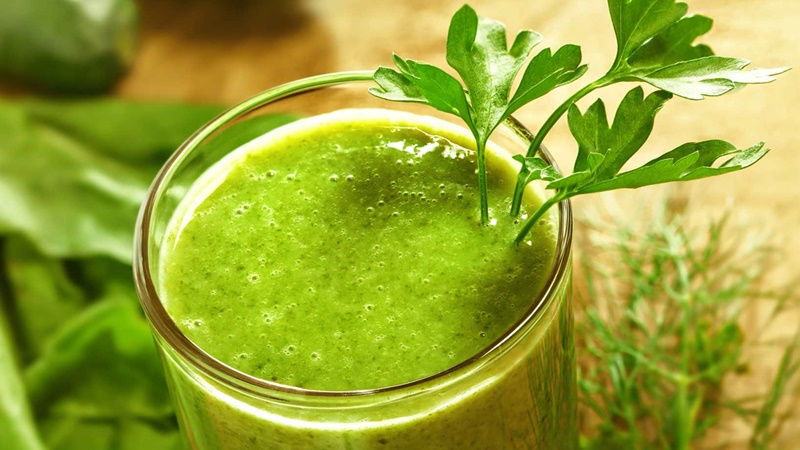Can i eat celery during pregnancy?
Unlike most other vegetables, there is more harm than good from eating celery during pregnancy. It contains a substance that can provoke a miscarriage or premature birth, as it causes a strong rush of blood to the smooth muscles of the uterus. How to properly use a vegetable during pregnancy and whether it is worth doing it, we will tell you in detail in the article.
The content of the article
Celery properties
Celery - one of the lowest calorie herbaceous plants. The vegetable contains beneficial phytonutrients, vitamins and minerals.
Greens contain 90% of the daily value of beta-carotene (provitamin A), there are flavonoids: zeaxanthin and lutein, which have immunostimulating functions.
The leaves and seeds contain many volatile essential oils, which include terpenes, mainly limonene (75–80%), and sesquiterpenes such as β-selenene (10%) and humulene.
Chemical composition
The stem of the plant is rich in minerals, including sodium and chlorine.
Main components:
- D-limonene (60%);
- selenene (10%);
- a number of related phthalides (3%) - 3-n-butylphthalide, sedanenolide and sedanonic anhydride.
Celery contains potentially toxic polyacetylenes, including falcarinol.
The nutritional value of 100 g of vegetable is shown in the table.
| Organic compounds | Content | Percentage of Daily Value |
| Calorie content | 16 kcal | <1% |
| Protein | 3.46 g | 6% |
| Fats | 1.12 g | 4,5% |
| Carbohydrates | 3 g | 5,5% |
| Cellulose | 2.1 g | 5,5% |
| Vitamin complex | ||
| Folates | 36 μg | 9% |
| Niacin | 0.320 mg | 2% |
| Pantothenic acid | 0.246 mg | 5% |
| Pyridoxine | 0.074 mg | 6% |
| Riboflavin | 0.57 mg | 4% |
| Thiamine | 0.021 mg | 2% |
| Vitamin A | 85 mg | 15% |
| Vitamin C | 3.1 mg | 5% |
| Vitamin K | 29.3 mcg | 24% |
| Minerals | ||
| Sodium | 80 mg | 5% |
| Potassium | 260 mg | 5,5% |
| Calcium | 40 mg | 4% |
| Copper | 0.35 mg | 4% |
| Iron | 0.20 mg | 2,5% |
| Magnesium | 11 mg | 3% |
| Manganese | 0.103 mg | 4,5% |
| Phosphorus | 24 mg | 3% |
| Zinc | 0.13 mg | 1% |
Benefits for women
Celery is one of the most useful for the female body of vegetables:
- The stem contains phthalides, which reduce the level of stress hormones, cholesterol, and dilate blood vessels. Potassium acts as a vasodilator, lowers blood pressure.

- The vegetable prevents urinary tract infections. The seeds eliminate uric acid. Celery extract has antibacterial properties.
- Regular consumption of the juice of the plant before meals helps to reduce weight.
- The juice is used to maintain youthfulness of the skin, giving it softness and elasticity.
- Polyacetylenes prevent cancer. Biologically active flavonoids contain apigenin and luteolin, which fight free radicals and stop cancer cells in the body.
- Phytoestrogens relieve menopausal symptoms.
- Celery is rich in fiber, which helps prevent constipation.
Is it possible for pregnant celery
In order for the use of the product while waiting for the baby to be beneficial, it is important to consult a doctor first. Only then can you include the vegetable in your diet.

In the early stages
During early pregnancy, when the embryo is still loosely anchored in the uterus, there is a high probability of miscarriage. The substances contained in the vegetable increase blood circulation in the small pelvis. Together with the gases in the intestines, this stimulates the uterus and increases its tone, increasing the risk of termination of pregnancy.
Second trimester
During this stage of pregnancy, progesterone slows down the digestive system.Combined with the pressure of a growing baby, this increases the risk of stomach acid pushing upward, causing heartburn. The enlarged uterus pushes the stomach, pushing stomach acids upward.
Important! Alkaline foods, such as celery, can help relieve or completely control symptoms by neutralizing the acid.
At a later date
When eating a vegetable at this stage of pregnancy, flatulence, bloating, pain in the umbilical region occur. After 22 weeks of pregnancy, celery can cause an allergic reaction in the baby, which will persist after childbirth.
Why pregnant women shouldn't have celery
The vegetable contains uterotonic and emmenagogic substances: apiol, apigenin, myristicin, which can provoke uterine contractions, causing bleeding. This will result in miscarriage or premature birth, which is dangerous for both the mother and the baby.
The plant causes increased gas formation, which creates discomfort in the well-being of the expectant mother. Saturated essential oils often become allergens during pregnancy.
Contraindications and precautions
The main contraindications for eating a vegetable:
- varicose veins and thrombophlebitis;
- diseases of the kidneys and gastrointestinal tract;
- enterocolitis and colitis;
- severe allergies;
- uterine or heavy menstrual bleeding.
Since celery is rich in oxalates, it is not recommended for people suffering from inflammation or other diseases of the bladder. These substances also interfere with the absorption of calcium.
It is interesting:
In what trimester is it useful to eat carrots during pregnancy?
Is it possible to eat parsley during pregnancy?
Is it possible for pregnant women to have dill: harm and benefit for the expectant mother and child.
Recommendations

Celery consumption during pregnancy should be limited. Without consequences, a woman is allowed to eat no more than 3 tsp daily. vegetable in any form.
Attention! It is not recommended to use juice from greens during pregnancy. Only in rare cases and only for medicinal purposes do they drink 50-75 ml per day.
The plant is used as a seasoning for various dishes.
Conclusion
Celery normalizes metabolism and water-salt balance, improves digestion. The substances contained in it (apiol, apigenin, myristicin) cause contractions of the uterus and often provoke premature birth and sometimes miscarriage. Therefore, during pregnancy, the vegetable is eaten with caution and only after consulting a doctor.